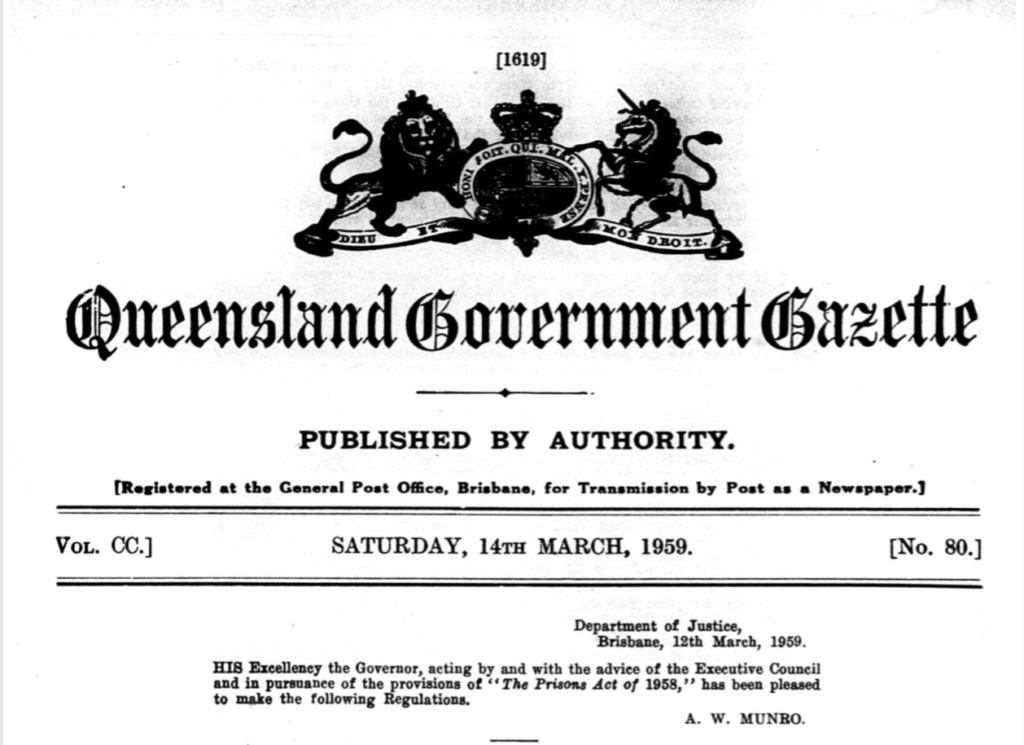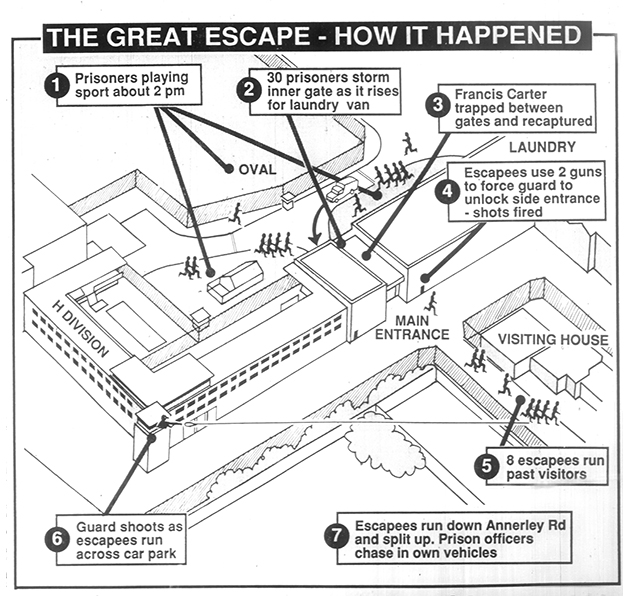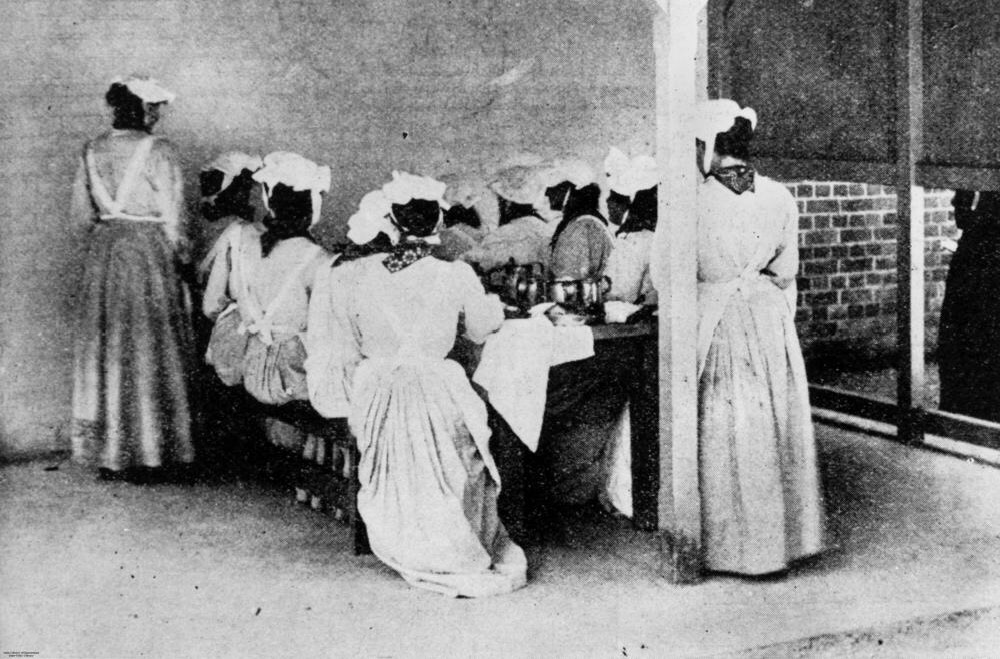BOGGO S2 E8 – Rules and Regs – Treatment, Discipline and Conduct
- On : 21 March, 2019
- By : Boggo Road Gaol
- Category : Stories
- View : 2317
BOGGO S2 E8 – Rules and Regs – Treatment, Discipline and Conduct
In 1959 a new Prisons Act came into force. Sweeping away out of date procedures, clarifying roles and improving prisoner’s rights. The act laid out clearly punishments and the powers of prison officers. Every officer was expected to know the regulations like the back of his hand. Part 12 of the Regulations – Treatment, Discipline and Conduct of Prisoners would form the crucial foundation that would determine the day to day management in the prison. The rules and regs would decide what prisoners and officers could and couldn’t do…
Formally gazetted on the 14th of March 1959, the new Prisons Act would replace the far out-dated 1890 Act. The Prisons Act is an essential piece of legislation that governs how prisons and places of punishment in the state are managed. It governs what the prisoners and the prisons officers can do and what they were not permitted to do under any circumstances.
By 1957, it was very clear that the old regulations had well and truly passed their usefulness. In February 1957, Boggo Road Gaol was overcrowded, and trouble was at fever pitch. Young men locked up in cramped conditions- sometimes three to a cell were increasingly rebelling.
Fever strikes again
At 8AM on Saturday, 2nd February 1957, two prisoners, Potter and Gallagher broke from the morning muster and climbed up onto the roof of C Wing Cellblock. As their feet burned on the hot corrugated iron, they shouted their demands.
We want a public inquiry. We aren’t animals. We can’t eat the food. You ask for better conditions and what happens – the stick you in the black dungeon….
This was not the only trouble at this time, but perhaps it was the one that garnished the most attention. Two weeks later as a result of the inquiry that was the subject of the prisoners demands heads rolled at Boggo Road.
Superintendent William O’Connor who citing ill health requested to be relieved of his post. After having controlled Brisbane Prison for 17 years, O’Connor would remain in the prison service as Chief Warder until 1965.
Deputy Comptroller-General Stewart Kerr was appointed Acting Superintendent of Brisbane Jail until a replacement could be found. Comptroller- General Mr. W. Rutherford was moved sideways to State Migration Officer. Rutherford had been in the role nine years, since 1948.
Stewart Kerr was appointed Comptroller-General of Prisons on the 21st of November 1957, determined to improve the situation in Queensland’s prisons. In a radical departure from tradition, Kerr personally attended Brisbane Prison every week and was present during roll-call. Any prisoner could raise his hand and request to speak to the C.G. To raise matters of concern without fear of recrimination. It was unheard of.
Re-writing the Rules
Stewart Kerr, a steely-eyed former detective sat with his wife, personally hand crafting the new act with a typewriter at his kitchen table. He knew every line of the 1890 act and the regulations, and he knew it needed desperate rewriting. In 1959 the new Prisons Act of 1958 and Regulations was enacted repealing the old Prisons Act of 1890 and Regulations – 70 long years after the last major overhaul.
In every cell, every prisoner had a copy of the regulations. It was more often than not the only reading material allowed. When the new regulations were released in 1959, they replaced the very well used 1890 regulations. A crisp new copy was placed in every cell and would remain there until the Kennedy inquiry nearly thirty years later.
Just as before, officers were expected to know the Act and the Regulations like the back of their hand. The prisoners too, would benefit from knowing the regulations … it will allow them to know the rules and of course how to break them!
In this episode of BOGGO, Gaol Director Jack Sim and Research Coordinator discuss some of the interesting regulations of the 1959 Act, as they pertain to the Treatment, Discipline and Conduct of prisoners (and officers). More importantly, the effect that these changes would have made to officers and prisoners alike.
BOGGO S2 E7- The Great Escape
- On : 14 March, 2019
- By : Boggo Road Gaol
- Category : Stories
- View : 4487
BOGGO S2 E7 – The Great Escape
The 1980s were the most turbulent decade in the history of Boggo Road Gaol. Riots, roof-top protests and hunger-strikes by prisoners became the norm. On Saturday 11 March 1989 the biggest mass-breakout ever took place when eight prisoners managed to escape Brisbane Prison. Officers remember it as the “Laundry Truck Escape”. Journalists called it the “Great Escape”. Prisoners called it the “Boggo Road Fun Run”.
The 1980s were the most turbulent decade in the history of Boggo Road Gaol.
Riots, roof-top protests and hunger-strikes by prisoners became the norm. On Saturday 11 March 1989 the biggest mass-breakout ever took place when eight prisoners managed to escapeBrisbane Prison.
Officers remember it as the “Laundry Truck Escape”. Journalists called it the “Great Escape”. Prisoners called it the “Boggo Road Fun Run”.
As the prison laundry van readied to leave No.1 Division, 30 prisoners exercising on a nearby oval raced towards the inner hydraulic gate. One got his leg caught as it closed; eight made it into the gatehouse. Armed with replica guns, they forced officers to open a side door before fleeing down the driveway to a waiting vehicle under gunfire from the tower.
All were recaptured, including the mastermind of the escape Frankie Post, convicted rapist and armed robber.
Blame was laid on the gatehouse officer who was selling raffle tickets at the time of the escape – though this was unfair. He had not received an internal memo issued two days earlier warning an escape was planned. A breakdown of communication and chronic under-staffing were really to blame.
This dramatic escape is now part of Queensland’s prison history…
In this weeks episode Gaol Director Jack Sim and research coordinator Sue Olsen talk about this thrilling escape in detail. Listen to this week’s episode of BOGGO – The official podcast of Boggo Road Gaol – Here
For more information and for tour times and prices visit our website www.boggoroadgaol.com
Nine Stories Nine Women -9- Elizabeth Tabke
- On : 9 March, 2019
- By : Boggo Road Gaol
- Category : Stories
- View : 1950
Nine Stories Nine Women -9- Elizabeth Tabke

Native Place: Queensland
Year of Birth: 1894
Trade or Calling: Domestic
Religion: Church of England
Education: R & W
Height: 5 feet 5½ inches
Weight: 8 Stone
Hair: Brown
Eyes: Grey
Complexion: Sallow
Build: Slight
Features: Four teeth missing upper jaw, three teeth missing lower jaw; Mole Left side of nose near eye; small mole under right eye at right side.
The terribly sad case of Elizabeth Tabke, a married woman with the desire for the nicer things. She was unable to care for herself or her children and stole numerous amounts of jewellery from stores all over Brisbane which she pawned for money. The court gave her several chances but little understanding. She seemingly required money for her family, she certainly was not stealing for her own glamourous means. Makes you question… was her married life all it was made out to be?
Elizabeth was born in February 1894 to Gustav and Alice Taebke in the sugar farming community of Tinana, Queensland. Her childhood was a very tumultuous one. Her father having a severe farming accident when she was just 11 years old sadly passing away a few days later in hospital. Her mother, Alice, had just had a baby at the time. Money was tight, the farming community in Tinana rallied around them. Alice remarried quite quickly, as was very typical of the day.
Soon enough Elizabeth would be married herself… though not legally. Elizabeth would be in a relationship with a man named Ralph Joseph William Ilsley and they would have one child together. However, Ralph was already married and had deserted his wife and two children… before taking off to the first world war. It is after she too is abandoned by Ralph… who has moved on to someone else that she first dabbles in crime.
Picture this, you are in post world war one Queensland. Rations are scarce and you have a brand-new baby. You would do just about anything to make ends meet. She did, she tried to obtain money by false pretences. Purchasing four watches, and then trying to sell them as a product worth much more. Of course, the judge was lenient, this was her first charge. If she would pay the restitution she would be released on good behaviour. Elizabeth was lucky.
This was the beginning of a shameful spiral for Elizabeth. Every year, seemingly around February and March, Elizabeth ran out of money. She would steal items like jewellery, watches, silver cutlery. Just about anything of value. Occasionally she stole some clothing… a dress, some underwear, baby clothing. Elizabeth was clearly living in difficult circumstances.
In 1921, Elizabeth serves her first stint in Boggo Road Gaol, six months with hard labour for stealing. After being released from this term she commits another stealing offence. Again however, Elizabeth is lucky, the judge takes pity on her and releases her to the care of the Salvation Army Home for wayward ladies.
Sadly, their tutelage had little effect and Elizabeth was in trouble time and time again for stealing. Each time in court, she would declare the same circumstances. She was stealing to feed her family. Which was very true. They were living in a rented room with little furniture. In 1924, another six months in Boggo Road Gaol.
Seemingly again things seemed to be turning around for Elizabeth, in 1925 she met William Archibald Sheppard. The two were married in January of 1926. Not long after their first child was born. Elizabeth, however, could not help herself. She wanted to create a beautiful home for her new family. She again committed crimes to provide her with money. The couple would then have a second child in 1928.
In July 1930, Elizabeth would make a big mistake. She would steal from a fortitude Valley Jewellers some wristlet watches and pawn them for money. When the police caught up with her… they also added thirteen charges that were committed in 1926… that they had been looking for her for years under her maiden name Taebke!
Elizabeth would again be sent to Boggo Road Gaol. This time for fourteen months, her longest ever sentence. Elizabeth would serve a full nine months before being released from Gaol. This would be her last charge. Elizabeth died in the Diamantina Hospital just three years later of a condition called Tuberculosis. A terrible lung complaint that is often carried for some years before killing the victim. Evidence that Elizabeth had had the condition for some time is that she had significant muscle wastage and was in frail health.
Her husband William would remarry just seven months later. He had three small children that needed care. Eventually he would have two more children. William passed away in 1939.
Both Elizabeth and William were buried in Toowong Cemetery, Brisbane. William in a beautifully marked war grave in portion ten. Elizabeth, in an unmarked hospital burial plot. Elizabeth had a hard life, full of tragedy and difficult circumstances.
Elizabeth made a lot of silly mistakes in her life, however, the circumstances in which she found herself made things seem utterly hopeless. Options were few. Elizabeth did what she had to do to make sure that she could support her family.
The story of Elizabeth Tabke is the last of our Nine Stories Nine Women series. We would like to thank all of the visitors that came to Boggo Road Gaol during Queensland Women’s Week 2019. We would also like to thank all of you that experienced the gaol via these stories and our podcasts. It has been our pleasure to share with you just some of the many stories of the women of Boggo Road Gaol.
Each Thursday we share our free podcast BOGGO and full accompanying written stories. Be sure to check back here each week to find more interesting tales of the prisoners of Boggo Road Gaol. Also, if you haven’t already… follow us on Facebook and Instagram to keep up to date with all the goings on around the Gaol. We look forward to locking you up again soon!
For more information and for tickets, times and prices please visit www.boggoroadgaol.com
Nine Stories Nine Women – 8- May Chenery
- On : 8 March, 2019
- By : Boggo Road Gaol
- Category : Stories
- View : 1631
Nine Stories Nine Women -8- May Chenery
In keeping with the theme of Queensland Women’s Week 2019 – Invest in Women, Invest in the future. Talking about financial insecurity and literacy. The stories of the women of Boggo Road Gaol directly represent what goes wrong when women are faced with financial insecurity and other difficult circumstances.
This year, in honour of these women we have produced Nine Stories Nine Women a series of short stories representative of the different circumstances that women found themselves in. May Chenery is the eighth of our nine stories.
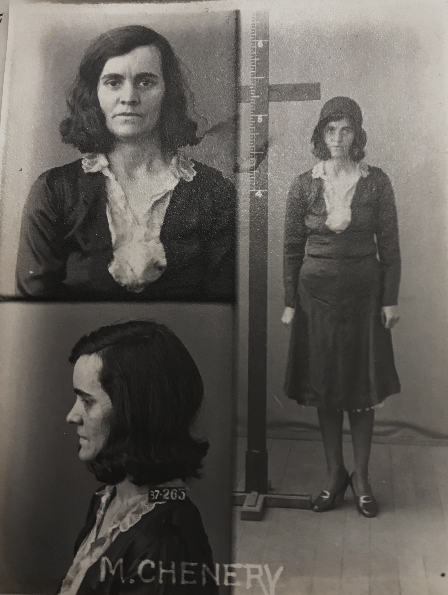
Native Place: Queensland
Year of Birth: 1905
Trade or Calling: Domestic
Religion: Church of England
Education: R & W
Height: 4 feet 10 inches
Weight: 6 Stone 5 pounds
Hair: Brown
Eyes: Brown
Complexion: Fresh
Build: Slight
Features: False teeth upper jaw
The extraordinary case of May Chenery is one for the books. Convicted of conspiracy to defraud, she with her lover were sentenced to time in Boggo Road Gaol. However, at the trial her lover threw himself on the mercy of the court, begging that she be set free… that she was a victim of circumstance. The Judge saw things a little differently…Built in a tiny frame of an even smaller woman is one incredible story.
May Chenery was born in 1905 to Ernest George Chenery and his wife Olivette Louise Francis. Ernest was an employee in the Post and Telegraph office and would eventually work as postmaster all-over north-western Queensland. Well educated May was certainly an astute woman.
In 1926 She went into business for herself. She became a travelling saleswoman, selling all kinds of articles to households in the western districts of north Queensland. It was in from her home in Mackay she was running her business. It was here that she met her silver fox. An older very successful man by the name of William Jackson. William a leading optometrist in the northern district. He was twenty-four years her senior, married and had a family residing in Sydney.
May however was instantly in love. He was everything she dreamed of… successful, handsome and presently apart from his wife and child.
Business was booming, May made quite the living for herself even purchasing herself a motor car. This was until 1929.
Conspiracy
On the 8th of June 1929 it was alleged in court that William Jackson and May Chenery obtained goods by deceit from the Diamond Slipper Company of Sydney. A manufacturer of shoes and slippers. The value of the goods was in excess of £700. In court, in their defence William Jackson stated that the company had tried “Salting” May Chenery and that they would get exactly the amount they deserved “Nothing”
Salting – it was described was sending goods in an out of date design at a price far above their reasonable value.
Allegedly, the Diamond Slipper Company salted May and the goods were valueless. However, it would come to light in court, that the company was not the only one to fall victim to William Jackson and May Chenery and that a total of £1250 worth of goods was missing and only £200 had been recovered during the ensuing investigation by police.
The evidence against the pair was enormous. The jury were not out very long when they came back with a verdict of Guilty against both parties.
They were convicted of Conspiracy to defraud The Diamond Slipper Company. They were referred to the bankruptcy court for the attempted recovery of any monies. In sentencing the following extraordinary scenes took place.
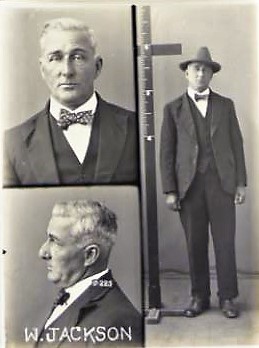
Justice Henchman in passing sentence of 12 months imprisonment with Hard Labour in the case of William Jackson and 9 months in the case of May Chenery.
Justice Henchman – “ I could not properly take the view that you were merely a tool. I assume that you were fully cognisant of what you were doing.” However, Justice Henchman agreed that Jackson was the more dominant personality and May, had over reached her good judgement.
So, on the 2nd of June 1930, May Chenery and William Jackson took the long ride to Boggo Road Gaol.
This case gets better yet!
For the first time in Queensland history a full bankruptcy court was held inside the walls of Boggo Road Gaol especially for this case. Six months into their sentence, May and William were again before the court, this time in the chapel of Boggo Road Gaol.
Interestingly, May was released just 12 days after this court was held. Thankfully for May this was the end of her troubles. She returned to the free world without William Jackson. She married in 1942 and moved to Sydney. Sadly, May Chenery died at the age of 45 in Sydney. Her husband only surviving her by three years.
Come and get locked up in Boggo Road Gaol for International Women’s Day Experience what life was like for the women from the earliest times of the female division in our fully immersive tour experience Join us for a History Tour on the 8th of March to be a part of our very special International Women’s Day event.
Tickets for International Women’s Day are strictly limited so get in quickly to secure your spot. You do not want to miss this! Click here to book now!
BOGGO S2 E6 – Queensland Women’s Week
- On : 7 March, 2019
- By : Boggo Road Gaol
- Category : Stories
- View : 1773
BOGGO S2 E6 – Queensland Women’s Week
In this episode Gaol Director Jack Sim and Research Co-Ordinator Sue Olsen discuss Queensland Women’s Week 2019, how it is being celebrated with exciting events in Boggo Road Gaol and Sue makes a very special announcement!
Queensland Women’s Week (March 1 – 9) is our chance to celebrate how women have helped to weave the fabric of our state. In Boggo Road Gaol, Women are an all too often forgotten piece of the story. Indeed, the only remaining section of Boggo Road Gaol, was built especially for women!

This year, in honour of these women we have produced Nine Stories Nine Women a series of short stories representative of the different circumstances that women found themselves in. These women all from the 1930’s era of Boggo Road Gaol represent a very small selection of the surviving records and photographs.
During Queensland Women’s Week we will be sharing the Nine Stories of Nine Women in full via our website. You can find the stories here https://boggoroadgaol.com/stories/
Announcement
Coming up on International Women’s Day (8th March) at Boggo Road Gaol, our Research Coordinator Sue Olsen will deliver a short speech announcing the completion of a project that has been undertaken by the research department over the past year.
The project, which has compiled a database of the women from Boggo Road Gaol’s earliest time period is the beginning of the most comprehensive collection of female prison records. Sue will discuss the future of the project and how you can become involved! So come along and join us for a cup of tea in celebration of International Women’s Day and hear all about it.
Special Event
As the culmination of Queensland Women’s Week and in celebration of International Women’s Day we are hosting a Free Morning Tea this Friday 8th of March 2019. To join us for morning tea you simply need to book your spot and come along on our 11am fully immersive History Tour.. experience Boggo Road Gaol from the inside the gates.
Listen to this week’s episode of BOGGO – The official podcast of Boggo Road Gaol – Here
Come and get locked up in Boggo Road Gaol for International Women’s Day Experience what life was like for the women from the earliest times of the female division in our fully immersive tour experience Join us for a History Tour on the 8th of March to be a part of our very special International Women’s Day event.
Tickets for International Women’s Day are strictly limited so get in quickly to secure your spot. You do not want to miss this! Click here to book now!
Nine Stories Nine Women -7- Mary Agnes Ward
- On : 7 March, 2019
- By : Boggo Road Gaol
- Category : Stories
- View : 1856
Nine Stories Nine Women -7- Mary Agnes Ward
In keeping with the theme of Queensland Women’s Week 2019 – Invest in Women, Invest in the future. Talking about financial insecurity and literacy. The stories of the women of Boggo Road Gaol directly represent what goes wrong when women are faced with financial insecurity and other difficult circumstances.
This year, in honour of these women we have produced Nine Stories Nine Women a series of short stories representative of the different circumstances that women found themselves in. Mary Agnes Ward is the seventh of our nine stories.

Year of Birth: 1924
Trade or Calling: Laundress
Religion: Roman Catholic
Education: R & W
Height: 5 feet 8 inches
Weight: 8 stone 7 pounds
Hair: Brown
Eyes: Blue/Green
Complexion: Fresh
Build: Slight
Features: Two missing Fingers Right hand.
19-year-old Mary Agnes Ward, is the definition of victim of circumstance. A former ward of the state she was released from care directly into poverty. Begging on the streets she was caught up in the cleanse by police of Brisbane from vagrants or undesirable girls…
Frustratingly, very little is obtainable about Mary Agnes Ward. The records of her early life being sealed under strict regulations. However, we do know that Mary was a ward of the state and had recently been released from care when she was caught up in a massive cleanse of Brisbane by the police.
What does it mean to be a ward of the state? A child can be made a ward of the state, even if the parents are alive. Usually, this happens when the parents become incompetent to take care of the child due to reasons like mental illness, chronic substance abuse, or physical disability. … Children who are in trouble with law are also often made wards of the state.
Mary was charged twice in the same year, only having been out of Boggo Road Gaol for a number of days before being charged the second time. Each charge was for having insufficient means of support. Basically she was in poverty and had no money to support herself.
Now this insufficient means was also a tricky charge. A person could be charged with insufficient means or Vagrancy simply as a charge to take you off the street as an “undesirable” Poverty then as it is today seen by some to be a filthy, lazy existence… however as we know it can be absolutely the complete opposite.
The Cleanse
At this time, we are in the midst of the second world war… Brisbane has been thrust onto the world stage when soldiers from the United States of America came to port here for some desperately needed Rest and Relaxation. Also Brisbane served as part of the port system for the Pacific Fleet. The arrival of the soldiers brought with it… women from all over Queensland seeking a good fellow to marry them and perhaps even see the world. It also brought to town women solely with the purpose of making a quick dollar off of the visiting men. It is thought that newly freed Mary was more looking for a fellow to help her escape.
However, being poverty stricken that was terribly unlikely she was much more likely to fall into the trap of being a lady used for entertainment and getting roped into making a quick dollar instead.
Seemingly though, Mary resisted this temptation. Unfortunately for her, the police charged by the government were keeping an eye out for any seemingly undesirable women and locking them up. Sweeping the street clean so to speak. Of course, this only worked for as long as they were locked up!
Thankfully when Mary was released from Boggo Road Gaol, she married and turned her life around. A happy ending for a victim of circumstance. As with the beginning of her story, the ending is not really known either. Mary does not appear in the records of Boggo Road Gaol again…
Come and get locked up in Boggo Road Gaol for International Women’s Day Experience what life was like for the women from the earliest times of the female division in our fully immersive tour experience Join us for a History Tour on the 8th of March to be a part of our very special International Women’s Day event.
Tickets for International Women’s Day are strictly limited so get in quickly to secure your spot. You do not want to miss this! Click here to book now!
Nine Stories Nine Women -6- Bertha Jane Jones
- On : 6 March, 2019
- By : Boggo Road Gaol
- Category : Stories
- View : 1825
Nine Stories Nine Women -6- Bertha Jane Jones
In keeping with the theme of Queensland Women’s Week 2019 – Invest in Women, Invest in the future. Talking about financial insecurity and literacy. The stories of the women of Boggo Road Gaol directly represent what goes wrong when women are faced with financial insecurity and other difficult circumstances.
This year, in honour of these women we have produced Nine Stories Nine Women a series of short stories representative of the different circumstances that women found themselves in. Bertha Jane Jones is the sixth of our nine stories.
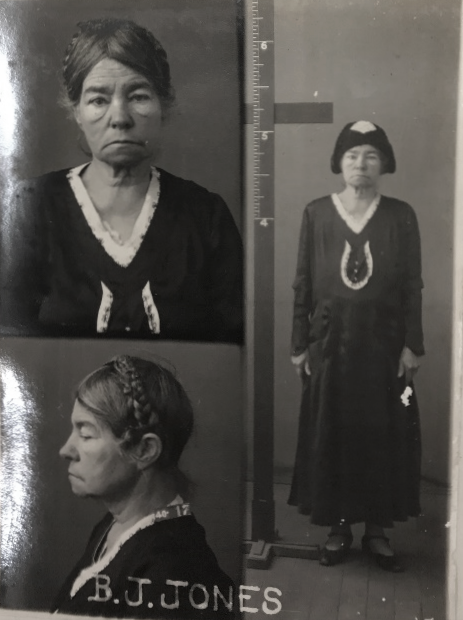
Native Place: England
Year of Birth: 1865
Trade or Calling: Nurse
Religion: Church of England
Education: R & W
Height: 5 feet
Weight: 7 Stone 10 ounces
Hair: Fair
Eyes: Blue
Complexion: Fresh
Build: Slight
Features: Mole under left nostril; Scar on bottom lip; 3 vaccination marks on left bicep.
Bertha Jane Jones, a 68-year-old nurse, was caught up tragically assisting an unmarried mother to end her pregnancy. This is a time in which contraception for women was non-existent, women often made the difficult decision to end their pregnancy. There were a few shonky pills and medicines being developed but overwhelmingly women turned to experienced midwives, nurses and even mothers. Bertha Jane Jones was one of these nurses. Unfortunately, the young woman died….and four people would serve a sentence for her death….
Born Bertha Jane Lloyd, she met and married a young dispenser and moved to Queensland to make their way in the world. Bertha and her husband both having served in the Royal Medical Corps in the Boer War their medical experience would serve them well. George Jones would go overseas again in the First World War. During this time, Bertha would be alone in raising their daughter.
George would return home safely, however unable to return to his previous position he would take a job as a clerk. The family would move to Wynnum eventually taking up a farmstead lease.
Bertha was a renowned midwife. However, she also had been tasked with the position of performing procedures to abort unwanted pregnancies. This is a time in which contraception for women was non-existent, women turned to experienced midwives, nurses and even mothers to help them in their condition. Unfortunately, all too commonly the procedure went terribly wrong. Either from catastrophic bleeding or terrible infection, Women died. It was this exact case, that Bertha would spend her time in Boggo Road Gaol.
Murder!
In August, 1929 a murder charge was preferred against Bertha in the death of Mrs May Ellen Hall. Bertha had aided in terminating a pregnancy for Mrs Hall, allegedly unbeknownst to her husband.
May Hall died in the Brisbane General Hospital of Septicaemia ten days after the procedure. In an extraordinary move the court ordered that Mrs Hall would give evidence on her death bed with her not expecting to survive. Bertha was held in custody for the Murder of May Hall.
The court case would take months. Eventually however, Bertha was found not guilty for the Murder with the controversial decision not to allow the evidence provided by May Hall. (now deceased) It was argued about the timing and the recording of the evidence.
However, it was not over with yet. Bertha would again be taken into custody and the matter brought before the Supreme Court under appeal. Finally, in February 1930 an announcement of No True Bill in the case against her was found. In other words, the prosecution had no further evidence and the case could not be proved.
Some would say she literally got away with murder, it has to be remembered that these procedures were often seen as the only option by desperate women. Also, that more often than not they were performed in unsterile environments and often in the woman’s home.
I’m Innocent
Eerily, in August 1932; Bertha found herself again in trouble. Charged with conspiracy to bring about a certain event. More precisely to abort the pregnancy of Betty Ogle. Unfortunately, Betty Ogle too had died. However, this time Bertha had company in court, with three others being charged for the same offence.
Betty Ogle had died from catastrophic bleeding. Bertha had warned that she could not be moved and that a doctor should be sent for. Sadly, her brother tried to move her and by the time a doctor could be arranged poor Betty was dead.
Betty had gone to Nurse Jones for assistance with a pregnancy to a young man named Robert Brodie. Robert, his brother Jack and Jack’s wife Eileen were the co-accused in the case.
All four were accused of the unlawful killing of Betty Ogle, but the charge was reduced to conspiracy as we mentioned earlier.
After a lengthy and sometimes emotive trial all four accused were convicted and sentenced to two years with hard labour at Boggo Road Gaol.
Jack and Eileen Brodie had only been married five months and were to be released after six months with hard labour on the condition that they be of good behaviour for 18 months and pay a bond of £100.
Bertha who was ill collapsed in the dock when she was sentenced. She sobbed bitterly as she was carried down the steps to the cells. Bertha served her time and was released from Boggo Road Gaol on the 11th of January 1934 a broken woman. She returned to her husband at their home at Wynnum. When the farm got too much for them, they took to a home called “The Cottage” in Mitchelton. It was here that Bertha died five years later.
Come and get locked up in Boggo Road Gaol for Queensland Women’s Week! Experience what life was like for the women from the earliest times of the female division in our fully immersive tour experience Join us for a History Tour on the 6th or 8th of March to be a part of our very special Queensland Women’s Week events.
Tickets for Queensland Women’s Week are strictly limited so get in quickly to secure your spot. You do not want to miss this! Click here to book now!
Nine Stories Nine Women -5- Jeromine Carlotti
- On : 5 March, 2019
- By : Boggo Road Gaol
- Category : Stories
- View : 1581
Nine Stories Nine Women -5- Jeromine Carlotti
In keeping with the theme of Queensland Women’s Week 2019 – Invest in Women, Invest in the future. Talking about financial insecurity and literacy. The stories of the women of Boggo Road Gaol directly represent what goes wrong when women are faced with financial insecurity and other difficult circumstances.
This year, in honour of these women we have produced Nine Stories Nine Women a series of short stories representative of the different circumstances that women found themselves in. Jeromine Carlotti is the fifith of our nine stories.
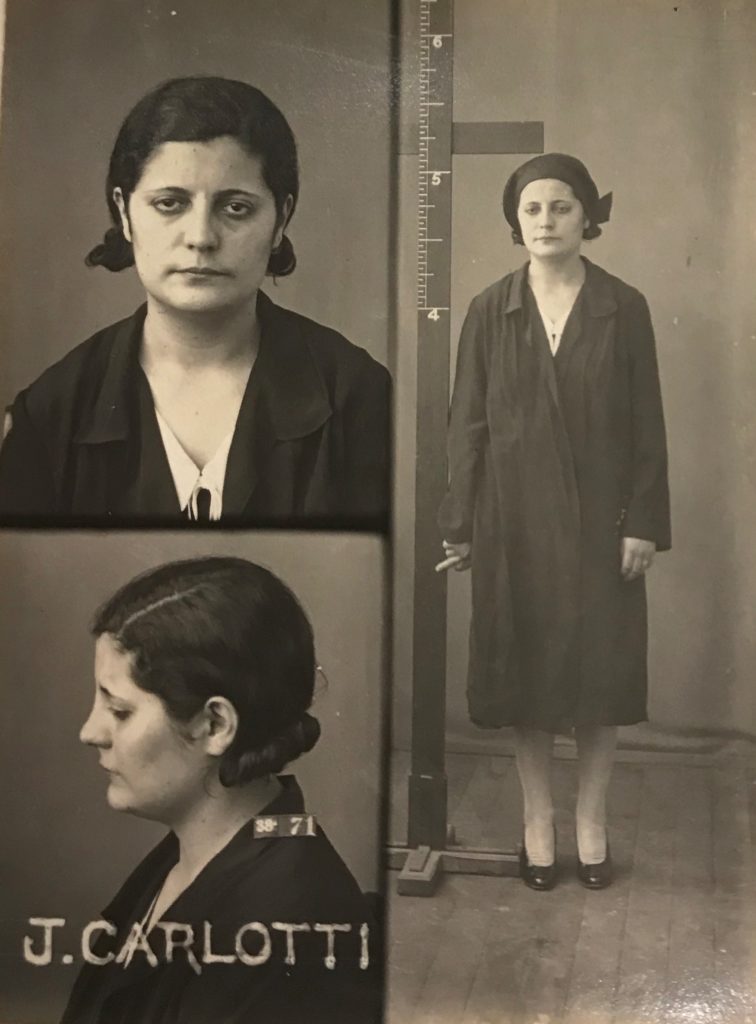
Where Born: France
Trade or Occupation: Prostitute
Age: 30
Religion: Roman Catholic
Height: 4 feet 11 inches
Weight: 8 Stone
Make: Medium
Complexion: Sallow
Hair: Black
Eyes: Brown
Education: R & W
Descriptive Marks: 6 x Vaccination marks left arm; Ears pierced ; Scar left thumb; two small scars left hand; Surgical scar on abdomen.
Sadly, we know very little about Jeromine Carlotti. Her story, and time in Boggo Road Gaol was very short. However, hers is an important story to tell. Jeromine Carlotti was incarcerated for being a prohibited immigrant. That is, she failed a language test, required by law to allow citizenship. Six months was her sentence unless she was deported sooner…
Her story is very complicated, it is not known exactly when she arrived in Australia. She was the victim of slave traders that operated in France and in Australia. Women from France were smuggled into Australia promised a fresh start and a significantly better life with a wealthy supporter. The women smuggled from Australia to French ports too were promised the same extravagant life. Unfortunately for these women… in both directions it was a terrible ruse.
It is thought that Jeromine had been in Australia for up to three weeks according to official reports… and had failed a dictation language test and was picked up as a prohibited immigrant.
The Test
From Federation in Australia in 1901 the Commonwealth Government became in control of the immigrants that entered Australia. Particularly refusing entry to particular classes of people, namely Non-European people and people from the South Sea Islands. A dictation test could be given to prohibit entry to undesirable immigrants, not only to non-Europeans but also to those who had contagious diseases or criminal records, people who were believed to be morally weak or unable to support themselves.
The test could also be applied to contract labourers who were thought to be taking jobs from Australians. The test consisted of writing out fifty words in a European language, (after 1905, any prescribed language) dictated by an immigration officer. The choice of the language used was at the discretion of the officer and the aim of the test was to fail those to whom it was administered. If by chance the undesired immigrant passed the test, it could be repeated using different languages until the object of failure was achieved.
Basically, immigrants deemed undesirable stood no chance at all in staying in Australia. Jeromine was one of these. It is not even known how much of the information listed on her admission to Boggo Road Gaol is even correct. Particularly that of her occupation; It is quite feasible that Jeromine was indeed a lady of the streets, however more likely, that was the reason for her being refused entry; especially as she could read and write.
So, Jeromine was sentenced to serve 6 months inside the walls of Boggo Road Gaol unless of course she was deported sooner. Which she was.. officially deported on the 1st of March 1931 on the ship Orford just twelve days into her sentence. Poor Jeromine was looking for a new start… and was refused that opportunity – A victim of a broken system.
Come and get locked up in Boggo Road Gaol for Queensland Women’s Week! Experience what life was like for the women from the earliest times of the female division in our fully immersive tour experience Join us for a History Tour on the 6th or 8th of March to be a part of our very special Queensland Women’s Week events.
Tickets for Queensland Women’s Week are strictly limited so get in quickly to secure your spot. You do not want to miss this! Click here to book now!
Nine Stories Nine Women – 4 – Dorothy Weaver
- On : 4 March, 2019
- By : Boggo Road Gaol
- Category : Stories
- View : 1686
Nine Stories Nine Women – 4 – Dorothy Weaver
In keeping with the theme of Queensland Women’s Week 2019 – Invest in Women, Invest in the future. Talking about financial insecurity and literacy. The stories of the women of Boggo Road Gaol directly represent what goes wrong when women are faced with financial insecurity and other difficult circumstances.
This year, in honour of these women we have produced Nine Stories Nine Women a series of short stories representative of the different circumstances that women found themselves in. Dorothy Weaver is the fourth of our nine stories.
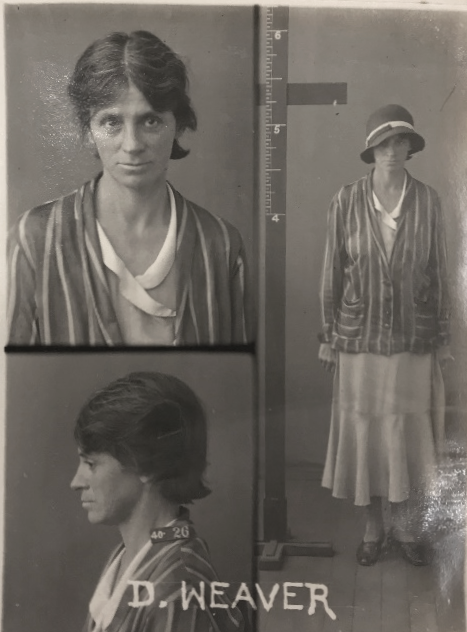
Native Place: New South Wales
Year of Birth: 1894
Arrival in State: 1933 Overland
From Where: New South Wales
Trade or Calling: Housewife
Religion: Church of England
Education: R & W
Height (without boots): 5 feet 2 inches
Weight: 7 Stone 6 pounds
Hair: Brown
Eyes: Brown
Complexion: Sallow
Build: Slight
Special Marks and Features: Operation Scar left side of abdomen and burn scar under left knee
It is true, Dorothy Weaver was an extraordinary notorious crook. Known by at least fifteen aliases. She has posed as a doctor, stolen goods worth hundreds of pounds and pretended to be the poor hard done by mother. However, this woman was born on the wrong side of the tracks, to an unwed mother. Abandoned, she had little choice in how to make ends meet. Her beginning would see her in and out of prisons her entire life…
Born Elsie Vera Bruce, in Marrickville, New South Wales in 1894. Dorothy’s life of crime would begin at the age of just 18… well at least what is on her adult record anyhow. Just like a child, Dorothy like to pretend. Either to make ends meet or to simply get what she wanted… She would begin by pretending to be the daughter of some wealthy land owner. Rack up hundreds and hundreds of pounds worth of goods at all sorts of stores all over New South Wales. Most of her aliases are the surnames of the victims of her many crimes.
By 1924, she was known by the press as ‘The Queen of Shams” with the report in the Brisbane Truth suggesting she had fleeced at least 1000 victims with her impositions. One of her favourite shams is to pretend to be a female doctor and rack up expensive bills with chauffer driven vehicles… often sleeping in the vehicle… before doing a runner on the expense. Since her first charge Dorothy or Vera La Bruce as she was known then… by this time had racked up some 14 years imprisonment… but had not served nearly that much.
We will skip forward however to one of her Queensland crimes… another false pretence charge. This time for obtaining £6 from the cash orders and loans office by false pretences. She stated to the clerk that her husband was in the employ of the railways and that she had furniture to secure her the loan. However, it was discovered that not only had she no furniture… the room that she was residing in was rented, that she was caring for her two small children… and that her husband was in Gaol!
She stated was unable to work as the children were too small to leave at home by themselves. The police were notified, and Dorothy was found at the Church of England shelter with her two children.
Dorothy having been only released a month ago on a similar charge was held in prison for three months…
One thing is for sure… this is not the last time that Boggo Road Gaol would see Dorothy Weaver…. Or whatever name she will use next…. The trick is figuring out what name she will use!
Come and get locked up in Boggo Road Gaol for Queensland Women’s Week! Experience what life was like for the women from the earliest times of the female division in our fully immersive tour experience Join us for a History Tour on the 6th or 8th of March to be a part of our very special Queensland Women’s Week events.
Tickets for Queensland Women’s Week are strictly limited so get in quickly to secure your spot. You do not want to miss this! Click here to book now!
Nine Stories Nine Women -3- Sarah Ann Somerville
- On : 3 March, 2019
- By : Boggo Road Gaol
- Category : Stories
- View : 1609
Nine Stories Nine Women -3- Sarah Ann Somerville
In keeping with the theme of Queensland Women’s Week 2019 – Invest in Women, Invest in the future. Talking about financial insecurity and literacy. The stories of the women of Boggo Road Gaol directly represent what goes wrong when women are faced with financial insecurity and other difficult circumstances.
This year, in honour of these women we have produced Nine Stories Nine Women a series of short stories representative of the different circumstances that women found themselves in. Sarah Ann Somerville is the third of our nine stories.
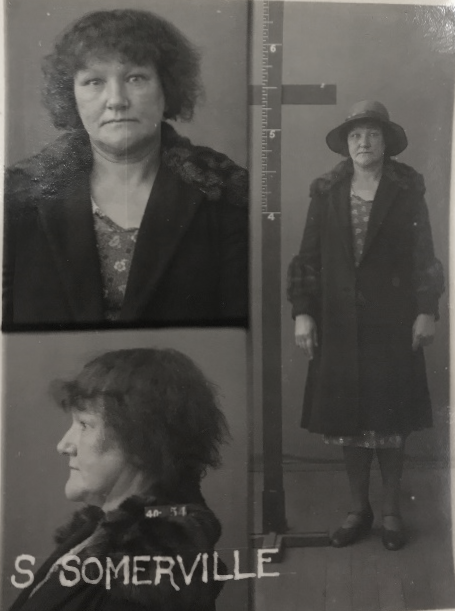
Native Place: England
Year of Birth: 1882
Trade or Calling: Cook
Religion: Church of England
Education: R & W
Height (without boots): 5 Feet 3 Inches
Weight: 10 Stone
Hair: Brown
Eyes: Grey
Complexion: Fair
Build: Stout
Marks and Special Features: Three vaccination marks left bicep
Sarah Ann Somerville is another woman who has experienced great loss and desperate circumstances. Three times married, Sarah found herself Bigamously married and charged, she lost her home all while attempting to care for her infant daughter. When all refuge was refused to her, she turned to selling her body and to cope with the pain – Alcohol.
Born Sarah Ann Seeds in Maryport, Cumberland, England she was raised in a working class family. At the age of 27 she departed England to work in Australia as a domestic. Arriving in Melbourne in 1910 and travelling by coastal ship to Brisbane. Her Brother was a seaman in the Customs Department. As a nominated emigrant it is presumed that he sponsored her travel.
Just a year later she married Benjamin Charles Somerville, a successful butcher in Fortitude Valley at the Salvation Army mission house, located in Leichardt street; Sadly just eight months later, Benjamin died when he fell from his horse, fracturing his skull. Sarah was expecting their first child at the time. Sarah was fortunate, she had the family assets to help her get by and she was able to reside with her brother in law and his wife.
Here she met Frank Edward Forsdike, also a widower with three children. He worked as a dairy farmer, residing at Toowong. It is understood that their marriage was unhappy. The birth of the baby from the first marriage caused immediate tension. They married just five months after the baby was born. They separated shortly after.
Sarah Ann moved to Wynnum to operate a boarding house. Here she met a man named Ulick Thomas Burke on a train ride to the city. He had placed an advertisement for a housekeeper. He spotted the young mother on the train and somehow managed to “persuade her” to marry him. They married the next day. The trouble with this was…. She was still legally married to Frank Forsdike! She was charged with Bigamy.
It seems that even though she was convicted she stayed with Frank Forsdike. They had another child together in 1920. However everything seems to have spiraled out of control from there. By 1925 she was working as a cook at a boarding house when she was charged with haven stolen food from the pantry.
It seems it was as late as 1926 that she started to consume Alcohol, probably sooner, it was this that pushed Sarah Ann Somerville into Boggo Road Gaol. She would be in so many times for theft in the coming years that the Judges, growing more and more exasperated eventually began sentencing Sarah to longer and longer periods of time inside. In all of her cases before the court, she always used the fact that she had been drinking as an excuse. It seems that she would get blind drunk and do silly things. Once even having stolen two gallons of wine! (7.5L) Perhaps these longer sentences brought with it the hope of saving her from herself. However, all to no avail, her lifestyle had taken its toll. Sarah would pass away in the Brisbane Hospital in 1938 from Pneumonia aged just 56.
Come and get locked up in Boggo Road Gaol for Queensland Women’s Week! Experience what life was like for the women from the earliest times of the female division in our fully immersive tour experience Join us for a History Tour on the 3rd, 6th or 8th of March to be a part of our very special Queensland Women’s Week events.
Tickets for Queensland Women’s Week are strictly limited so get in quickly to secure your spot. You do not want to miss this! Click here to book now!

